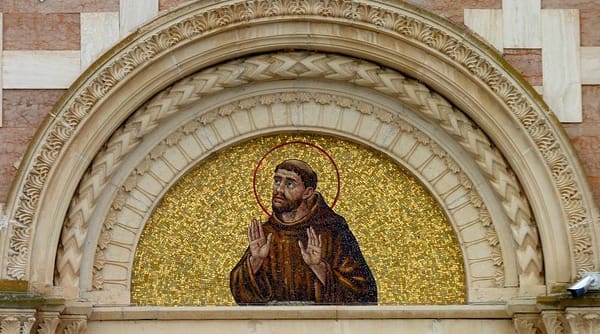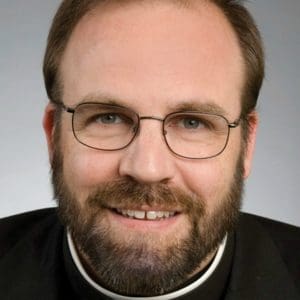On this, the Memorial of St. Francis of Assisi (Oct. 4), let’s reflect on a few lessons from his life.
1. On the possibility of radical conversion and the role of affliction and humiliation – The son of a successful cloth merchant, St. Francis enjoyed a very affluent, easy life growing up and partook of the permissiveness of the times. He was a natural leader and drew to himself a crowd of young people who spent their nights in wild parties. His biographer, Thomas of Celano, wrote this of him: “He attracted to himself a whole retinue of young people addicted to evil and accustomed to vice.” Francis had visions of grandeur and became a knight. Perhaps the horrors of battle and a year as a prisoner of war began a gradual conversion in him. The Fourth Crusade was called in 1205 and Francis impulsively bought new armor and sallied forth. He turned back, however, perhaps as a result of his own anxiety, and more surely due to a vision he had in which God rebuked his manner of life. When he returned home, Francis was derided as a coward and suffered the great anger of his father.
This crisis in Francis’ life ultimately led to his conversion—and a dramatic one at that. The Book of Psalms says, Before I was afflicted I strayed. But now I have kept your word, O Lord (Psalms 119:67). We all know people whose conversion seems unlikely, but God may yet humble them and draw them to conversion. Further, we ought never to underestimate the fact that affliction and humiliation may be necessary components of conversion for many of us. At times we may feel as though God has abandoned us or others whom we love. In fact, He may be doing some very important work. Our greatest enemy is pride and our best friend is humility. Humility and affliction may be gifts in strange packages. Learn to trust in God’s ways, painful though they may sometimes be. God may be drawing us to deeper conversion.
2. On the freedom of poverty and simplicity – Francis and his early companions embraced a life of radical poverty. So severe was this poverty that some thought them mad and rebuked them as irrational. To this, St. Francis responded, If we had any possessions we should need weapons and laws to defend them. One hagiographer wrote, Possessing something was the death of love for Francis. Also, Francis reasoned, what could you do to a man who owns nothing? You can’t starve a fasting man, you can’t steal from someone who has no money, you can’t ruin someone who hates prestige. They were truly free [1]. Not all of us may be able to embrace such severe poverty due to our obligations to others. More and more, though, we ought to experience a growing simplicity of life that frees us from the power of this world. Poverty and simplicity are powerful and fruitful gifts of God. They, too, are gifts in strange packages. If we can learn to embrace them, we will discover greater freedom.
3. On the Love of God’s Church and how reform is best accomplished – During St. Francis’ lifetime the Church was in need of reform. Greed, worldliness, and scandal were problems among both the clergy and laity. Heresies were abundant. Some, noting sin in the Church, chose to hate the Church and leave her. Others, like Francis, heard the call of God, who never ceases to love His Church; they intensified their love for the Church and worked for her reform. In a vision, St. Francis sensed this call from God: “Francis, repair my Church.” Gradually he deepened his understanding of the Lord’s call and began that reform by seeing first to his own life.
It is possible for critics of the Church to decry the sins of others yet not see their own. Francis began in the vineyard of his own life and then went forth, gently preaching conversion to his neighbors through personal example. The movement for reform spread. It was a grassroots effort; it was personal. Within ten years there were more than 5,000 men in Francis’ community; the Poor Clares (which he founded with St. Clare of Assisi) were also growing.
True reform begins with us. Simply denouncing the sins of others or of the Church, real though they may be, seldom has lasting effect. The best reform starts with personal conversion. Personal conversion spreads to others and then reform is underway. It works. If we allow God to set us on fire, then we can spread that fire.
4. On unity with all creation and the gift of wonder and awe – St. Francis thought of nature—all of God’s creation—as part of his brotherhood. In some sense, the sparrow was as much his brother as was the Pope.
There is a tendency today among some in the radical environmental movement to see man as the enemy of the natural world rather than an integral part of it, to view man as an outsider with respect to the natural world rather than as a partaker and member of it. For St. Francis, though, there was brotherhood.
In brotherhood, there are legitimate needs we satisfy for one another. Nature supplies us and we in turn help to perfect nature. We have done this in our best moments by helping to increase the yield of our fields and bringing far greater bounty to the earth through advances in agriculture and animal husbandry. We also seek to master disease and push back the destructive boundaries of what is unruly in nature (e.g., infestation). Although we have often transgressed through unnecessary pollution, in the end we are not the enemies of nature but companions and brethren to the natural world.
St. Francis can help us to find this balance. He surely exhibited a sense of gratitude for God’s creation and a deep wonder and awe at all that God has given. We, too, ought to develop a deep appreciation for the beauty of God’s work and we should reverence our very selves as a part of that creation.
5. On the Need to Evangelize the Muslim World – We may think that the struggle with the Muslim world is new, but it is not. In his life, St. Francis decided to go to Syria to convert the Moslems (the preferred term until about 1940) while the Fifth Crusade was being fought. In the middle of a battle, Francis decided to do the simplest thing and go directly to the sultan, Melek-el Kamel, in order to make peace. He and his companion were captured and Francis was taken to the sultan. Francis challenged the Moslem scholars to a true test of religion by fire, but they refused. Francis proposed to enter the fire first, under the condition that if he left the fire unharmed, the sultan would have to recognize Christ as true God. Although the sultan turned down the challenge, he was so impressed that he allowed Francis to preach to his subjects. While Francis did not succeed in converting him, the sultan’s last words to Francis were these: Pray for me that God may deign to reveal to me that law and faith which is most pleasing to him.This work of Francis’ and his attempted rapprochement with the Moslem world had far-reaching consequences, long past his own death: after the fall of the Crusader Kingdom, it was the Franciscans, of all Catholics, who were allowed to stay on in the Holy Land and were recognized as “Custodians of the Holy Land” on behalf of Christianity [2].
Today, with the emergence of extremist forms of Islam, we need more than ever to have the courage of St. Francis to engage the Muslim world and try to bring them to Christ. It may be difficult work and successes may be few at this stage, but God calls us to be faithful, not necessarily successful. Ultimately, success is up to God. We who are Catholics have a special role in this evangelization because the Muslim world shares with us a respect for Mary, Mother of Jesus our Lord. I’ll elaborate more on that point in a future post.
This first video below attempts to capture the magnificence of creation. It is set to the hymn “All Creatures of Our God and King,” whose lyrics are based on a poem by St. Francis known as “The Canticle of the Sun.”
This post originally appeared in Community in Mission and is shared with permission.
Image of St. Francis courtesy of Pixabay.




